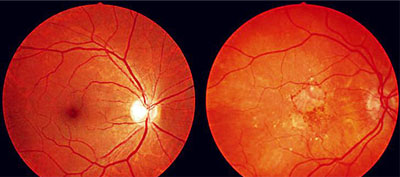
Introduction to
Macular Degeneration
Macular Degeneration is caused by the deterioration of the central portion of the retina, the inside back layer of the eye that records the images we see and sends them via the optic nerve from the eye to the brain. The retina’s central portion, known as the macula, is responsible for focusing central vision in the eye, and it controls our ability to read, drive a car, recognize faces or colors, and see objects in fine detail.
One can compare the human eye to a camera. The macula is the central and most sensitive area of the so-called film. When it is working properly, the macula collects highly detailed images at the center of the field of vision and sends them up the optic nerve to the brain, which interprets them as sight. When the cells of the macula deteriorate, images are not received correctly. In early stages, macular degeneration does not affect vision. Later, if the disease progresses, people experience wavy or blurred vision, and, if the condition continues to worsen, central vision may be completely lost. People with very advanced macular degeneration are considered legally blind. Even so, because the rest of the retina is still working, they retain their peripheral vision, which is not as clear as central vision.
Types of Macular Degeneration
There are two basic types of Macular Degeneration: "dry" and "wet." Approximately 85% to 90% of the cases of Macular Degeneration are the "dry" (atrophic) type, while 10-15% are the "wet" (exudative) type.
Stages of Macular Degeneration
There are three stages of Age-related Macular Degeneration (AMD).
-- Early AMD, Most people do not experience vision loss in the early stage of AMD, which is why regular eye exams are important, particularly if you have more than one risk factor. Early AMD is diagnosed by the presence of medium-sized drusen (yellow deposits beneath the retina).
-- Intermediate AMD, At this stage, there may be some vision loss, but there still may not be noticeable symptoms. A comprehensive eye exam with specific tests will look for larger drusen and/or pigment changes in the retina.
-- Late AMD, At this stage, vision loss has become noticeable